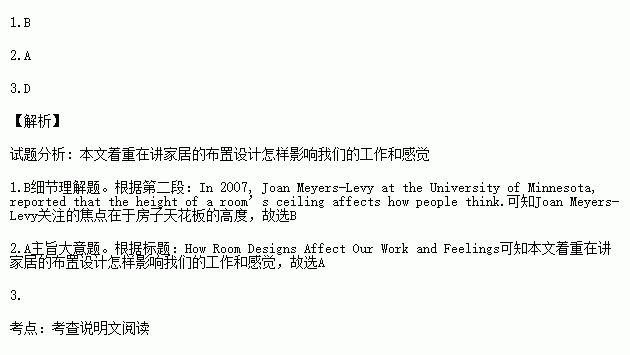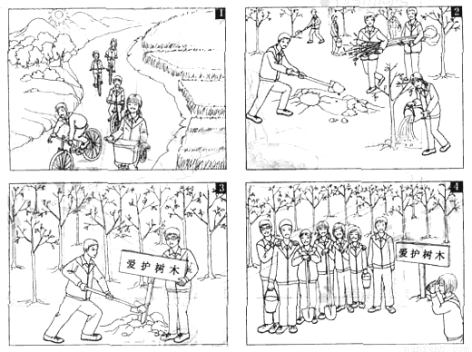题目内容
Architects have long had the feeling that the places we live in can affect our thoughts, feelings and behaviors. But now scientists are giving this feeling an empirical (经验的,实证的) basis. They are discovering how to design spaces that promote creativity, keep people focused and lead to relaxation.
Researches show that aspects of the physical environment can influence creativity. In 2007, Joan Meyers-Levy at the University of Minnesota, reported that the height of a room’s ceiling affects how people think. Her research indicates that higher ceilings encourage people to think more freely, which may lead them to make more abstract connections. Low ceilings, on the other hand, may inspire a more detailed outlook.
In additions to ceiling height, the view afforded by a building may influence an occupant’s ability to concentrate. Nancy Wells and her colleagues at Cornell University found in their study that kids who experienced the greatest increase in greenness as a result of a family move made the most gains on a standard test of attention.
Using nature to improve focus of attention ought to pay off academically, and it seems to, according to a study led by C. Kenneth Tanner, head of the School Design & Planning Laboratory at the University of Georgia. Tanner and his team found that students in classrooms with unblocked views of at least 50 feet outside the window had higher scores on tests of vocabulary, language arts and maths than did students whose classrooms primarily overlooked roads and parking lots.
Recent study on room lighting design suggests than dim (暗淡的) light helps people to loosen up. If that is true generally, keeping the light low during dinner or at parties could increase relaxation. Researchers of Harvard Medical School also discovered that furniture with rounded edges could help visitors relax.
So far scientists have focused mainly on public buildings. “We have a very limited number of studies, so we’re almost looking at the problem through a straw (吸管),” architect David Allison says. “How do you take answers to very specific questions and make broad, generalized use of them? That’s what we’re all struggling with.”
1.What does Joan Meyers-Levy focus on in her research?
A. Light. B. Ceilings.
C. Windows. D. Furniture.
2.The passage tells us that ___________.
A. the shape of furniture may affect people’s feelings
B. lower ceilings may help improve students’ creativity
C. children in a dim classroom may improve their grades
D students in rooms with unblocked views may feel relaxed
3.The underlined sentence in the last paragraph probably means that __________.
A. the problem is not approached step by step
B. the researches so far have faults in themselves
C. the problem is too difficult for researchers to detect
D research in this area is not enough to make generalized patterns
 阅读快车系列答案
阅读快车系列答案

